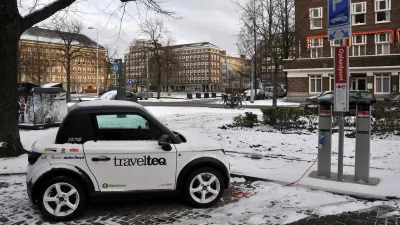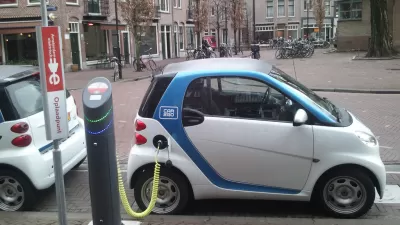It may seem odd that the continent of high gas taxes and strong environmental ethos would not take to electric vehicles. Focusing on the news that Renault will delay the release of a new EV, AutoblogGreen explores the poor sales of EVs in Europe.

With the notable exception of Norway and perhaps premium models (see below), Europe has not particularly welcomed the new electric vehicles (EVs), much to the chagrin of Renault-Nissan chief Carlos Ghosn who cites lack of demand for delaying the introduction of a new Renault EV, the Twingo ZE.
"The problem is that people aren't clamoring for the Twingo, leaving the order books fairly empty. The company now says it will delay the model's debut to an undetermined future date, Bloomberg News says...," writes Autoblog's Danny King.
What's odd is how EVs from the two companies in the "alliance" can fare so differently. Nissan Leaf is far way the best selling EV in the U.S. and globally, having sold 50,000 and 115,000 respectively. For a comparison with sales of other plug-in models, including plug-in hybrid electric vehicles (PHEV), see chart of 2014 EV sales in U.S. from Inside EVs.
On the other hand, Renault sold less than 20,000 its EVs, which includes three models, adds King. However, Renault is not marketed in the U.S.
In Norway, due to its generous incentives, the Tesla Model S is the best-selling car; Nissan Leaf number three.
at Bloomberg News offered this perspective from "Sascha Gommel, a Frankfurt-based analyst at Commerzbank AG who has a hold recommendation on Renault stock":
“Most people who buy electric vehicles tend to be premium buyers, as zero-emission cars are more expensive,” he said by phone. “They’d rather go to premium brands like Tesla or BMW, as opposed to a maker of conventional mass-market cars like Renault, which needs to justify the premium on its electric vehicles.”
FULL STORY: Renault delaying electric Twingo because no one wants one

Planetizen Federal Action Tracker
A weekly monitor of how Trump’s orders and actions are impacting planners and planning in America.

Maui's Vacation Rental Debate Turns Ugly
Verbal attacks, misinformation campaigns and fistfights plague a high-stakes debate to convert thousands of vacation rentals into long-term housing.

Restaurant Patios Were a Pandemic Win — Why Were They so Hard to Keep?
Social distancing requirements and changes in travel patterns prompted cities to pilot new uses for street and sidewalk space. Then it got complicated.

In California Battle of Housing vs. Environment, Housing Just Won
A new state law significantly limits the power of CEQA, an environmental review law that served as a powerful tool for blocking new development.

Boulder Eliminates Parking Minimums Citywide
Officials estimate the cost of building a single underground parking space at up to $100,000.

Orange County, Florida Adopts Largest US “Sprawl Repair” Code
The ‘Orange Code’ seeks to rectify decades of sprawl-inducing, car-oriented development.
Urban Design for Planners 1: Software Tools
This six-course series explores essential urban design concepts using open source software and equips planners with the tools they need to participate fully in the urban design process.
Planning for Universal Design
Learn the tools for implementing Universal Design in planning regulations.
Heyer Gruel & Associates PA
JM Goldson LLC
Custer County Colorado
City of Camden Redevelopment Agency
City of Astoria
Transportation Research & Education Center (TREC) at Portland State University
Jefferson Parish Government
Camden Redevelopment Agency
City of Claremont



























